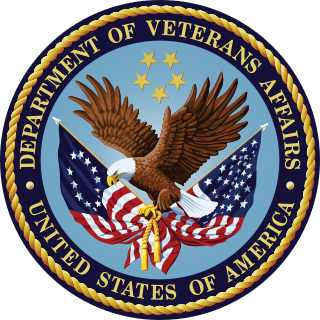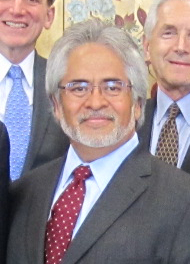
The United States Department of Veterans Affairs (VA) is a Cabinet-level executive branch department of the federal government charged with providing lifelong healthcare services to eligible military veterans at the 170 VA medical centers and outpatient clinics located throughout the country. Non-healthcare benefits include disability compensation, vocational rehabilitation, education assistance, home loans, and life insurance. The VA also provides burial and memorial benefits to eligible veterans and family members at 135 national cemeteries.
In law, an en banc session is a session in which a case is heard before all the judges of a court rather than by one judge or a smaller panel of judges. En banc review is used for unusually complex or important cases or when the court believes there is a particularly significant issue at stake.
In United States patent law, utility is a patentability requirement. As provided by 35 U.S.C. § 101, an invention is "useful" if it provides some identifiable benefit and is capable of use and "useless" otherwise. The majority of inventions are usually not challenged as lacking utility, but the doctrine prevents the patenting of fantastic or hypothetical devices such as perpetual motion machines.
An administrative law judge (ALJ) in the United States is a judge and trier of fact who both presides over trials and adjudicates claims or disputes involving administrative law. ALJs can administer oaths, take testimony, rule on questions of evidence, and make factual and legal determinations.
United States federal administrative law encompasses statutes, regulations, rules, common law rulings, and directives issued by the Office of Information and Regulatory Affairs in the Executive Office of the President, that together define the extent of powers and responsibilities held by administrative agencies of the United States government. The executive, legislative, and judicial branches of the U.S. federal government cannot always directly perform their constitutional responsibilities. Specialized powers are therefore delegated to an agency, board, or commission. These administrative governmental bodies oversee and monitor activities in complex areas, such as commercial aviation, medical device manufacturing, and securities markets.
Francis M. Jackson is an American veterans law and personal injury attorney who is also an authority on Social Security disability. He has practiced law since 1977 and is a founding partner in the law firm of Jackson & MacNichol.
Social Security Disability Insurance is a payroll tax-funded federal insurance program of the United States government. It is managed by the Social Security Administration and designed to provide monthly benefits to people who have a medically determinable disability that restricts their ability to be employed. SSDI does not provide partial or temporary benefits but rather pays only full benefits and only pays benefits in cases in which the disability is "expected to last at least one year or result in death." Relative to disability programs in other countries in the Organisation for Economic Co-operation and Development (OECD), the SSDI program in the United States has strict requirements regarding eligibility.

The Disabled American Veterans (DAV) is an organization created in 1920 by World War I veterans for disabled military veterans of the United States Armed Forces that helps them and their families through various means. It was issued a federal charter by Congress in 1932. It currently has over 1 million members. As a 501(c)(4) social welfare organization, it is outside the purview of – and therefore not rated by – Charity Navigator. DAV's Employer Identification Number (EIN) is 31–0263158.

The United States Court of Appeals for Veterans Claims is a federal court of record that was established under Article I of the United States Constitution, and is thus referred to as an Article I tribunal (court). The court has exclusive national jurisdiction to provide independent federal judicial oversight and review of final decisions of the Board of Veterans' Appeals.

Jerry Edwin Smith is an American attorney and jurist serving as a United States circuit judge of the United States Court of Appeals for the Fifth Circuit.
The United States military formerly excluded gay men, bisexuals, and lesbians from service. In 1993, the United States Congress passed, and President Bill Clinton signed, a law instituting the policy commonly referred to as "Don't ask, don't tell" (DADT), which allowed gay, lesbian, and bisexual people to serve as long as they did not reveal their sexual orientation. Although there were isolated instances in which service personnel were met with limited success through lawsuits, efforts to end the ban on openly gay, lesbian, and bisexual people serving either legislatively or through the courts initially proved unsuccessful.

Jimmie V. Reyna is an American lawyer, former president of the Hispanic National Bar Association, and a United States circuit judge of the United States Court of Appeals for the Federal Circuit.

The United States has compensated military veterans for service-related injuries since the Revolutionary War, with the current indemnity model established near the end of World War I. The Department of Veterans Affairs (VA) began to provide disability benefits for post-traumatic stress disorder (PTSD) in the 1980s after the diagnosis became part of official psychiatric nosology.

The Board of Veterans' Appeals (BVA) is an administrative tribunal within the United States Department of Veterans Affairs (VA), located in Washington, D.C. Established by Executive Order on July 28, 1933, it determines whether U.S. military veterans are entitled to claimed veterans' benefits and services. The Board's mission is to conduct hearings and decide appeals properly before the Board in a timely manner. The Board's jurisdiction extends to all questions in matters involving a decision by the Secretary under a law that affects a provision of benefits by the Secretary to Veterans, their dependents, or their Survivors. Final decision on such appeals are made by the Board based on the entire record in the proceedings and upon consideration of all evidence and applicable provisions of law and regulation. The Board's review is de novo.

H.R. 1405 is a bill "to amend title 38, United States Code, to require the Secretary of Veterans Affairs to include a notice of disagreement form in any notice of decision issued for the denial of a benefit sought, to improve the supervision of fiduciaries of veterans under the laws administered by the Secretary of Veterans Affairs, and for other purposes." It was introduced into the United States House of Representatives during the 113th United States Congress.
Kimberly Graves is a senior executive director for the St. Paul, Minnesota office of the Veterans Benefits Administration or VBA, a subsidiary organization of the United States Department of Veterans Affairs (VA). She is most known for a controversy beginning in 2014 in which she, along with another executive director within the VA, was accused of abusing her authority to take advantage of the VA's PCS procedures and of embezzling public funds.
Diana Rubens is a senior executive director for the Philadelphia office of the Veterans Benefits Administration or VBA, a subsidiary organization of the United States Department of Veterans Affairs (VA). She is notable for a 2014 controversy in which she, along with a colleague, was accused of abusing authority and embezzling public funds, taking advantage of the VA's PCS procedures.
Matal v. Tam, 582 U.S. 218 (2017) is a Supreme Court of the United States case that affirmed unanimously the judgment of the United States Court of Appeals for the Federal Circuit that the provisions of the Lanham Act prohibiting registration of trademarks that may "disparage" persons, institutions, beliefs, or national symbols with the United States Patent and Trademark Office violated the First Amendment.

Nieves-Rodriguez vs. Peake is a United States Court of Appeals for Veterans Claims case that dealt with the adequacy and weighing of medical opinions.
Kisor v. Wilkie, No. 18-15, 588 U.S. ___ (2019), was a US Supreme Court case related to the interpretation by an executive agency of its own ambiguous regulations. The case involved a veteran who had been denied some benefits from the United States Department of Veterans Affairs due to the agency's interpretation of its regulations. The case challenges the "Auer deference" established in the 1997 case Auer v. Robbins, in which the judiciary branch of the government normally defers to an agency's own interpretation of its own regulations in resolving matters of law. Lower courts, including the Federal Appeals Circuit Courts, ruled against the veteran, acknowledging the Auer deference.










